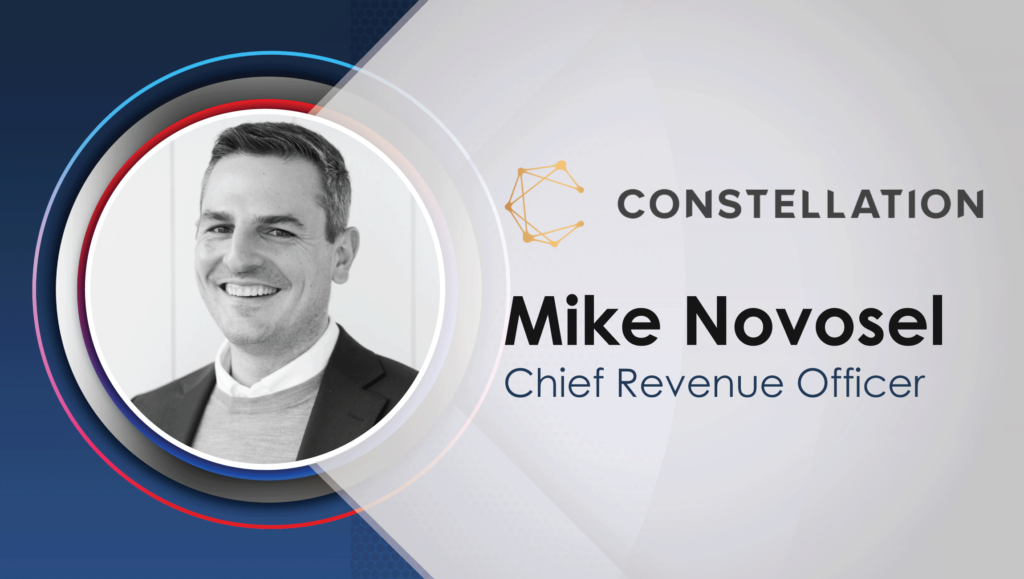Mike Novosel, Chief Revenue Officer at Constellation talks about the evolving role of today’s CROs in this short catch up with SalesTechStar:
_______
Welcome to this SalesTechStar chat Mike, tell us about yourself and more about your new role as Constellation’s CRO?
I started my career in finance as a bond trader and realized I preferred to be in a more dynamic, ever changing environment. That’s when I stumbled into the world of Martech. I worked my way from the ground up at Responsys, which was later acquired by Oracle, providing me with structured SaaS sales experience in a larger, more mature market. From there, I transitioned to AdTech, where I played a key role in taking programmatic advertising to market as a DSP, gaining front-line experience in change management, org design, and roles and responsibilities between brands and agencies. I then moved on to Cardlytics, where I helped transform the business by scaling new business and revenue operations before taking on the challenge of building the company’s growth verticals from scratch.
After trying my hand in the startup world, I received a call from Diana Lee, CEO of Constellation, and decided to join as CRO. My main responsibilities are scaling revenue growth and building a well-oiled Sales, Service, and Marketing machine by streamlining end-to-end processes and identifying opportunities for growth in green shoot industries that fit our ICP, such as Pharma, FinServ, and Legal, while also making our pricing, packaging, and servicing more efficient for our existing client base.
Read More: SalesTechStar Interview with Yoram Givon, VP of Engineering at Recurate
When it comes to boosting brand growth during tough market and economic times, what best practices would you follow and highlight that most other teams pay attention to as well?
I tend to keep it simple and always work backwards from the customer. What pain point(s) do they have, and what led them to find appeal in what we offer, that they decided to work with us? Which other industries experience the exact same pain points that we’ve yet to engage, and look / behave the same as the clients we serve today? Where do they “live” – Events, Content they read daily, Trade Associations they belong to, etc.? Who are Consultants I can engage that come from those industries to help me understand how they think, make decisions, and buy? Regardless of economic times I believe in being efficient with building brand growth early, and I learned this first-hand in scaling Growth Verticals at Cardlytics. Building our Fuel business was a perfect case study; I knew nothing about the Fuel industry, so I hired a seasoned Industry Marketer, learned from her, and applied it to the strategy we built. We invested in being front-and-center at specific trade associations, only doing Events where we could play the ground game efficiently (i.e pay-to-play 1:1s), and proactively engaging Content Providers that I knew our audience read daily to provide free insights/subject matter expertise, or identify low-cost high return paid opportunities. Keep it simple. Work backwards and build your action plan from there.
What are the typical traits of a modern day CRO that you feel should exist to thrive in the role soft and hard skills/tech skills?
Today’s CRO needs to have much more of an operator mindset vs. that of the past. At previous companies I’ve worked for, the function always leaned more toward a “Sales-minded” leader; utilizing the typical playbook of coaching, compensation, team structure and narrative in the market as a means of driving growth. While I always appreciated being a part of those types of systems and the strong revenue growth I was able to generate, my focus on process and efficiency left me feeling like we weren’t taking a data-driven approach to ensure that the growth we were driving was the right kind of growth. In today’s world, there are many more options in which vendors/tech a prospective client uses, so it puts so much more pressure on being intentional with your time and where you guide your team to invest it. I think the modern day CRO needs to maintain many of the soft-skill, customer-first practices and processes of the CRO of the past, but have a heightened appreciation for understanding the numbers and math that need to be monitored daily to make more informed decisions. In my experience, many CROs tend to focus solely on macro-level metrics such as pipeline volume, close rates, and overall performance, often neglecting the more nuanced micro-level metrics that are crucial for optimal capital and resource allocation.
By analyzing micro-level data such as cost of sale and payback periods for specific verticals, we can make more informed decisions on where to allocate our resources and invest more strategically for sustainable growth.
In today’s business landscape, time and capital are two of the most valuable and limited resources that a modern CRO must carefully and thoughtfully deploy, making it critical to be intentional and well-informed in their decision-making.
In your view: what should B2B sales and revenue teams do to upskill through 2023 based on evolving market and customer conditions – to be better set for the near future?
As leaders, we need to find ways to give our support functions more exposure to the voice of the customer, enabling them to better understand and appreciate the customer’s perspective, including the reasons why they chose our service, the pain points they experience, and the options available in the market. Returning to the concept of “relativity,” I have found that the communication breakdown between marketing, sales, and service often stems from a lack of shared understanding regarding the value that our services provide to the customer. By conducting monthly fireside chats with customers, we can bridge this gap and better equip our teams with the skills needed to deliver exceptional customer experiences.
I’m also a big proponent of financial acumen. I’d be shocked to believe that more than 30% of front-line sellers in today’s market have taken an accounting or corporate finance class, and the irony is that by lack of exposure to that part of the decision making process, they’re almost always at an inherent disadvantage. Dollars for purchasing get approved on a relative basis; if what you’re selling me generates a higher return in a shorter period of time than the other solution I’m considering, then I’ll buy it. When the solution you’re proposing can deliver a clear and provable ROI that can be directly measured against my business line, I am able to justify allocating expenses from cost of goods sold (COGS) versus selling, general, and administrative expenses (SG&A), thereby increasing my ability to invest in the solution. I’m thankful for my training over the years from folks like Eric Shaver from Kensei Partners, as his strategy has led me and the teams I’ve managed to be much more successful. By framing your discussions in terms of numbers and relative allocation of capital, your teams will be much better prepared to succeed in a market where budgets and belts are being tightened.
For revenue leaders especially: what are some common go-to resources that you feel help enable growth learning and goals?
From a resource perspective, one of the first things I always do at any job I enter is sign up for all the publications that I know our clients read, and ensure my team does the same. Create an “industry news” Slack channel, start sharing, and you’ll see that people start inherently putting the customer first more and learn more about what our customers feel/think daily as a result. Go through your network, reach out to a client/former client you know, and ask if they can carve 30 minutes out one week to do a Q&A with your team. Thank them for their time with a gift card or bottle of wine. You’d be surprised by how eager clients are to share their stories and how invigorated your team feels afterward. Taking the time to listen to your client’s daily experiences can be a refreshing break from a busy day, and it enables your team to better empathize with their challenges and concerns, ultimately leading to growth and a deeper understanding of your client’s needs.
Finally, I would encourage any line managers to adopt the practice of Role Mapping and develop a Learning Plan at least every quarter. Give your team members a piece of paper during a 1×1, tell to write out their ideal next job, and the skills they’d need to do it well. Have them highlight any skills they currently lack but need to acquire. They now leave knowing how to “work backwards” from the role they aspire to, and what steps they need to take for professional development. Your team members will leave the meeting empowered, informed, and ready to take actionable steps towards achieving their career aspirations.
Read More: How AI Disrupts Online Customer Experiences – For Better or For Worse
Can you highlight more about the future of the B2B tech market and in what ways you expect to see it grow?
As we move forward, the growing trend of mass “personalization” is posing a challenge to the traditional one-size-fits-all approach of B2B SaaS in the past. Every buyer has more options and is being offered more flexible terms/ways to engage with a vendor, resulting in pressure on tech providers that aren’t ahead of the curve in offering more flexible buying, packaging, and service models. You’re going to see the companies that focus on “ease of buying/modifying” the terms of the engagement win out in the long run, as they recognize that the best way to serve a customer is by meeting their needs on their terms. Automation, partner > direct selling, and flexibility in pricing/service models are going to be a big theme and disruption in my opinion.

Constellation is a global, NYC-based SaaS company that’s seen exponential growth since its founding in 2016.Their proprietary marketing compliance technology allows top brands and Fortune 500s to
seamlessly build, launch and manage hyper-targeted campaigns at scale. The advanced data-feeding
system transforms complex data variables into thousands of creative asset iterations, instantly.
Constellation is revolutionizing marketing technology—particularly for companies in highly regulated
industries like Pharma, Banking, and Auto—with an automated solution that scales both creative and
regulatory approval processes.
Mike Novosel is Chief Revenue Officer at Constellation
Missed The Latest Episode of The SalesStar Podcast? Have a quick listen here!
Episode 166: Renewed Sales-Marketing Alignment Tips: with Melton Littlepage, CMO at Outreach
Episode 165: Why You Need Video In your Sales and Marketing Outreach: with Karthi Mariappan, Co-founder and CEO at Hippo Video
Episode 164: The Growth of Digital Experience Platforms with Darren Guarnaccia, president of Uniform





















